Fresh foods rabbits can and cannot eat are vital to understand if you want to keep your furry friend healthy and happy. As a pet owner, knowing which fresh foods are safe and which could cause harm is essential. Feeding the wrong foods can lead to digestive issues, discomfort, or even life-threatening health problems. While rabbits enjoy nibbling on various greens and fruits, some everyday items can be toxic to their digestive systems. A balanced diet that meets their nutritional needs is key to ensuring your rabbit’s long, happy life.
This guide aims to clearly understand which fresh foods are safe for your rabbit and which should be avoided. Whether you’re a new rabbit owner or looking to fine-tune your pet’s diet, you’ll find helpful tips and recommendations to help you make the best choices for your rabbit’s health. From leafy greens to sweet fruits, we’ll explore the do’s and don’ts of feeding your rabbit so you can confidently provide them with the tastiest and healthiest options. Dive in to learn how to keep your rabbit’s diet safe and satisfying!
Fresh Foods Rabbits Can And Cannot Eat: A Guide for Pet Owners
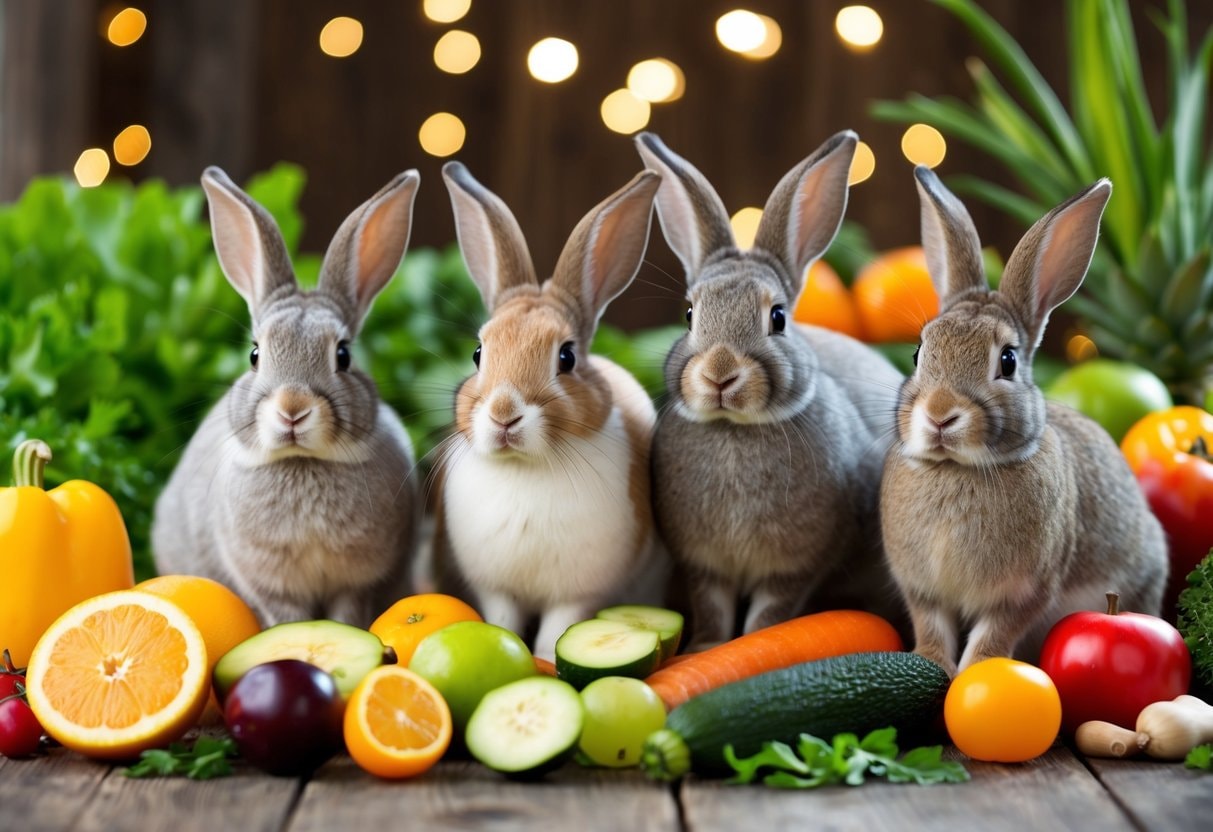
Rabbits have special diets that need careful planning. As a rabbit owner, you might wonder what fresh foods are safe for your furry friend. A well-balanced rabbit diet should consist of 80-90% hay, with the rest made up of pellets, fresh veggies, and occasional fruits.
Giving your rabbit the right fresh foods can boost their health and happiness. Leafy greens, carrots, and bell peppers are excellent choices for rabbits. But not all foods are safe. Some can make your bunny sick or even be toxic.
Knowing what fresh foods rabbits can and cannot eat is key to keeping your rabbit healthy. This guide will help you make intelligent choices for your bunny’s meals and treats.
Key Takeaways
- Rabbits need a diet primarily made up of hay (80-90%) to support digestion and dental health, supplemented with fresh vegetables and limited fruits.
- Leafy greens like kale, romaine lettuce, and bok choy are excellent for rabbits, while fruits like apples and berries should be given in moderation due to their high sugar content.
- Certain foods like avocado, chocolate, and onions are toxic to rabbits and should never be fed to them, as they can cause severe health issues.
- Introduce new foods gradually and in small amounts to avoid digestive problems. Always maintain portion control, especially with sugary treats like fruits.
- Proper nutrition impacts a rabbit’s dental, digestive, and overall health. Ensure a fiber-rich diet, plenty of fresh water, and regular vet consultations to keep your rabbit thriving.
Understanding Rabbit Nutrition
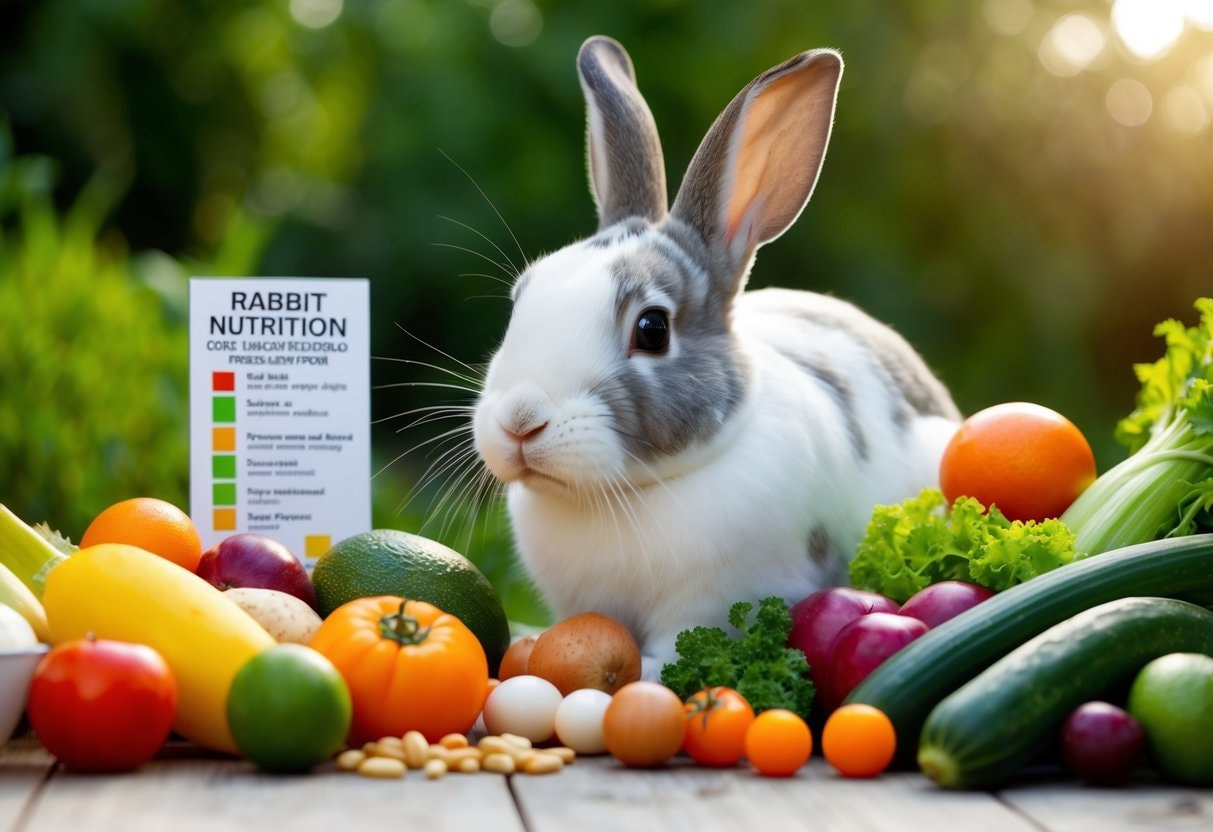
Rabbits need a balanced diet to stay healthy. Their main food should be hay, which gives them fiber for good digestion. However, it’s also essential to supplement their diet with fresh foods rabbits can and cannot eat in mind, ensuring they receive the right nutrients while avoiding harmful options.
Fresh veggies are essential, too. They provide vitamins and minerals. Leafy greens like lettuce and kale are great choices. Your rabbit needs vitamin A for eye health and growth. Carrots and sweet potatoes are good sources.
Vitamin C helps boost the immune system. Bell peppers and broccoli can give your bunny this vitamin. Calcium and phosphorus are key for strong bones. But too much calcium can be bad. Limit high-calcium foods like spinach.
Water is crucial for rabbits. Make sure your pet always has fresh, clean water to drink. Be careful with fruits. They have sugar and should only be given as treats. A small piece of apple or banana is enough. Some foods are not safe for rabbits.
Avoid giving them:
- Chocolate
- Onions
- Garlic
- Avocado
Celery is safe for rabbits. You can give them small pieces a few times a week. Remember, changes in diet can upset a rabbit’s stomach. Introduce new foods slowly and in small amounts.
Safe Fresh Foods for Rabbits
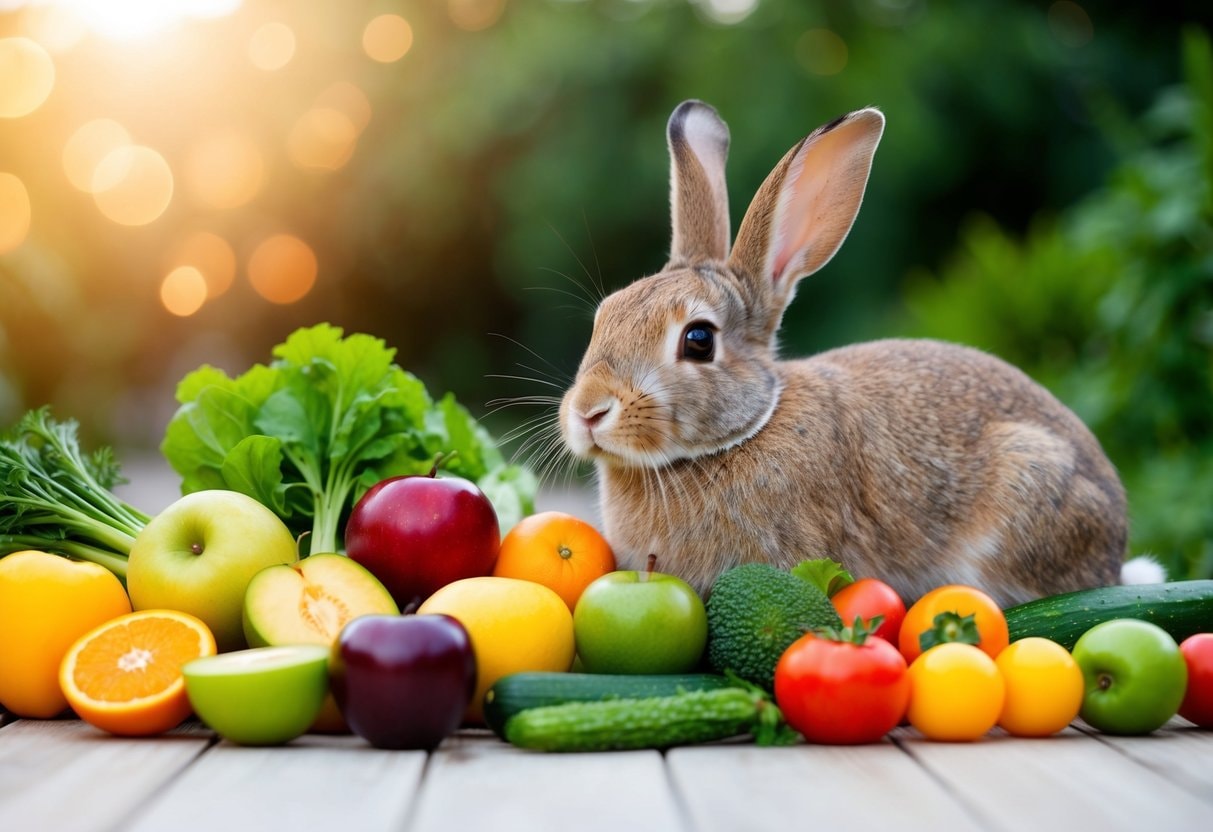
Rabbits need a variety of fresh foods rabbits can and cannot eat in their diet. These foods provide essential nutrients and help keep your bunny healthy. Let’s look at the safe options you can feed your rabbit.
Leafy Greens
Leafy greens are a great choice for rabbits. They’re packed with nutrients and fiber. You can give your rabbit 2 cups of fresh vegetables daily. Some safe leafy greens include:
- Kale
- Spinach (in moderation)
- Bok choy
- Watercress
- Cabbage
Be careful with spinach. It’s high in oxalic acid, so give it sparingly. Romaine lettuce is also safe but has less nutritional value than darker greens. Mix up the types of greens you offer to give your rabbit a balanced diet.
Vegetables
Fresh veggies add variety to your rabbit’s meals. They’re tasty and nutritious. Here are some safe vegetables for rabbits:
- Carrots (including tops)
- Celery
- Cucumber
- Bell peppers
- Broccoli
- Zucchini
- Pumpkin
Introduce new veggies slowly. This helps avoid digestive issues. Cut vegetables into small pieces to make them easier for your rabbit to eat. Avoid feeding too many starchy veggies like carrots. They’re high in sugar and should be given as treats.
Fruits
Fruits are tasty treats for rabbits. But they’re high in sugar, so give them in small amounts. Offer fruit no more than 1-2 times per week. Safe fruits for rabbits include:
- Apple (no seeds)
- Berries (strawberries, blueberries)
- Banana
- Melon
Always remove seeds and pits before feeding fruit to your rabbit. These can be harmful. Remember, fruit is a treat. It shouldn’t make up a large part of your rabbit’s diet.
Herbs
Herbs add flavor and variety to your rabbit’s meals. They’re also packed with nutrients. Many herbs are safe for rabbits to eat. Some good options are:
- Cilantro
- Basil
- Parsley
- Mint
- Dill
Fresh herbs are best. Dried herbs can be used but may have less nutritional value. Always wash herbs before feeding them to your rabbit. This removes any dirt or pesticides. Herbs can be a fun way to add variety to your rabbit’s diet. They’re also great for training treats.
Take a look at this video about safe foods for rabbits.
By: Victoria Raechel
Harmful Fresh Foods to Avoid
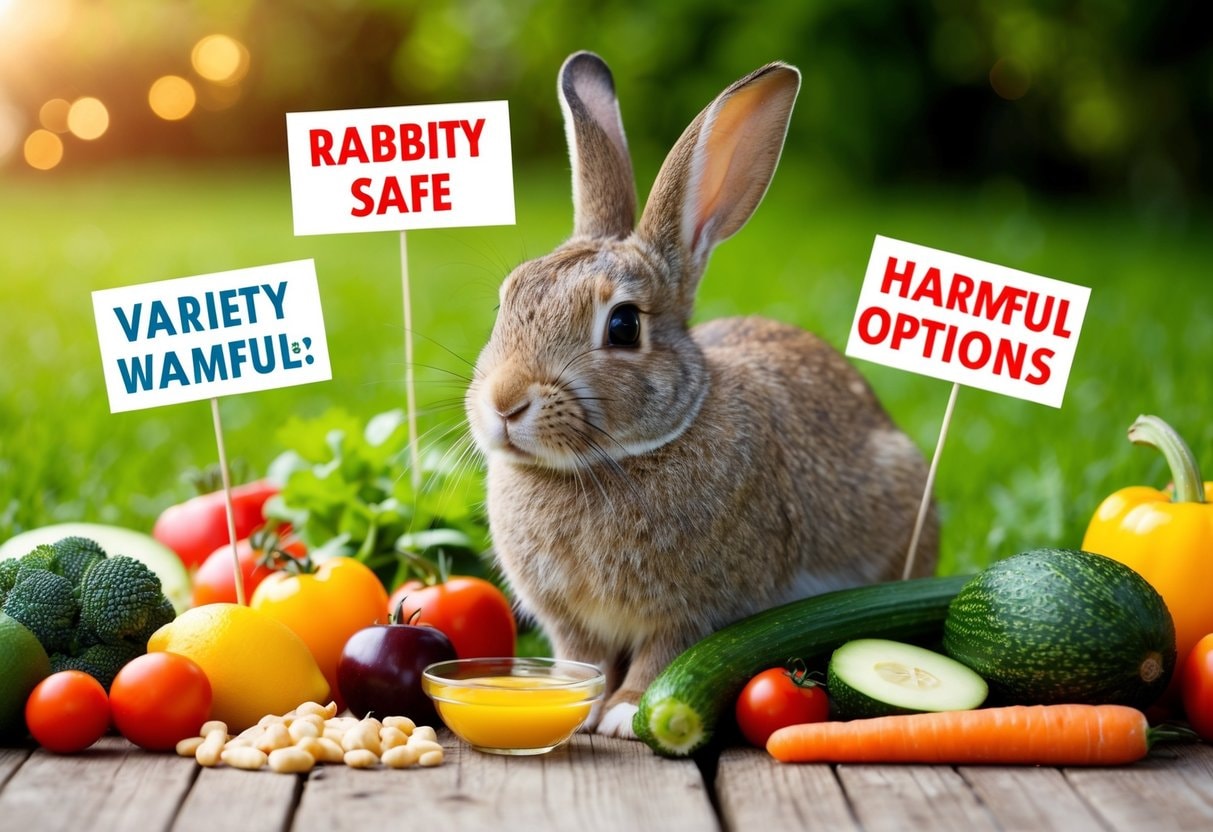
Some common fresh foods rabbits can and cannot eat may be dangerous. Certain fruits, vegetables, plants, and human foods may cause health problems or be toxic.
Dangerous Vegetables and Fruits
Avocados are very toxic to rabbits and should never be given. They can cause severe digestive issues and be fatal. Apple seeds contain cyanide, which is poisonous to rabbits. Onions and potatoes (especially green parts) are harmful. They contain substances that can damage red blood cells or be toxic.
Except for romaine and leaf lettuce, lettuce provides little nutrition and can cause diarrhea. While small amounts of carrots are okay as treats, too much can lead to obesity and dental problems due to high sugar content. Limit corn as well, as it’s hard for rabbits to digest.
Toxic Plants and Herbs
Many common garden plants are dangerous for rabbits. Daffodils, tulips, and other bulb flowers are toxic. Keep your rabbit away from these in your yard. Other harmful plants include:
- Hemlock
- Honeysuckle
- Iris
- Ivy
- Jasmine
Clover in large amounts can cause bloat. Some herbs high in oxalic acid, like parsley, should only be given in moderation. Always check if a plant is safe before letting your rabbit nibble on it. When in doubt, it’s best to avoid it.
Unsuitable Human Foods
Many human foods are bad for rabbits. Chocolate is toxic and can harm their health. Avoid all dairy products like milk, ice cream, and butter. Rabbits can’t digest lactose well. Other foods to keep away from your rabbit include:
- Bread and other baked goods
- Nuts and seeds (too high in fat)
- Meat (rabbits are herbivores)
- Eggs
- Processed foods like cookies or chips
Even healthy human foods like rice or sweet potatoes aren’t suitable for rabbits. Stick to a diet of hay, rabbit pellets, and safe vegetables to keep your bunny healthy.
Did You Know?
Some certain fruits and vegetables are harmful to rabbits. Pet owners should avoid giving them avocados, onions, and garlic. Rhubarb and potato leaves are toxic to rabbits as well. Additionally, rabbits should not be fed iceberg lettuce, as it can cause digestive issues.
Feeding Guidelines and Routines
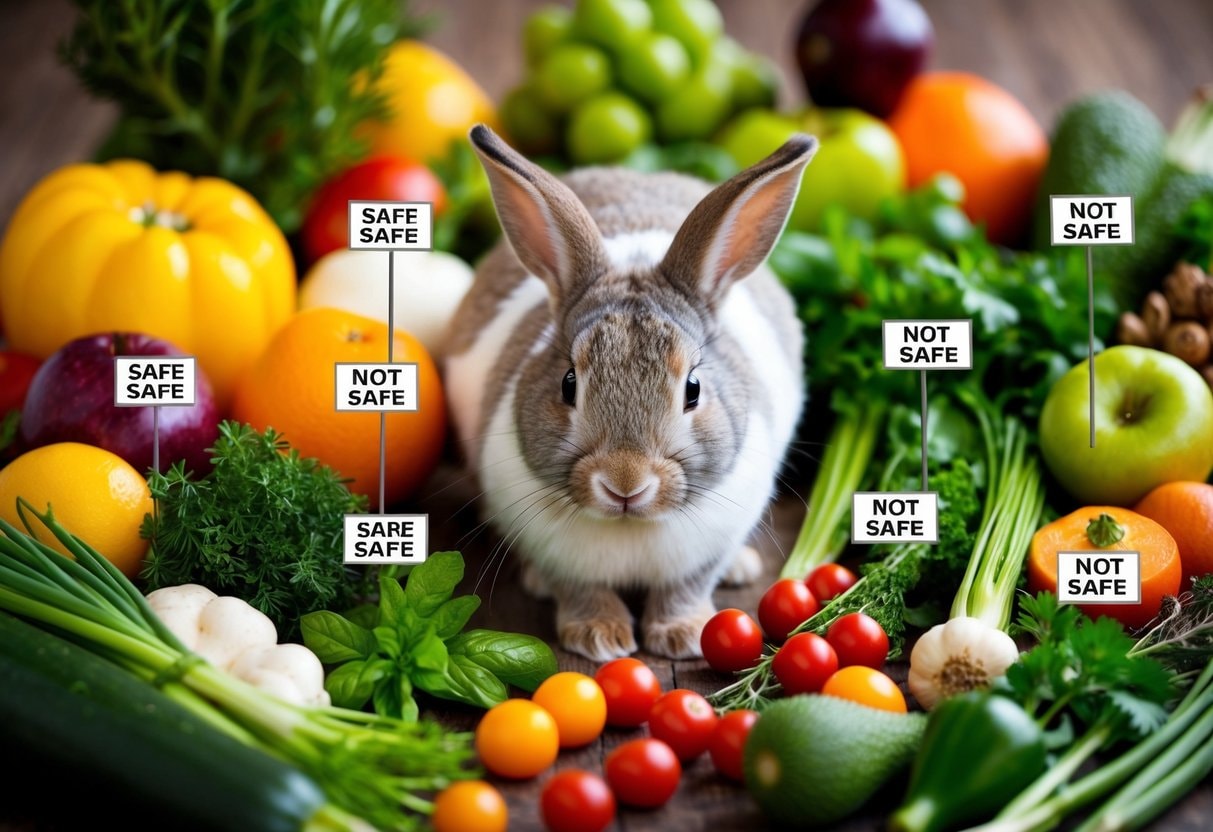
A proper rabbit diet consists of hay, fresh vegetables, limited pellets, and occasional treats. Understanding the fresh foods rabbits can and cannot eat is essential for maintaining their well-being. Stick to a consistent feeding schedule to keep your bunny healthy and happy.
Daily Diet Composition
Your rabbit’s main food should be unlimited hay. Offer fresh timothy hay or other grass hays daily. It’s crucial for digestion and dental health. Provide 1 cup of fresh vegetables per 2 pounds of body weight daily. Mix 3-6 different types. Good choices include:
- Romaine lettuce
- Carrot tops
- Cilantro
- Parsley
- Bok choy
Give a small amount of pellets based on your rabbit’s size:
- Under 5 lbs: 1/8 cup
- 5-10 lbs: 1/4 cup
- Over 10 lbs: 1/4 to 1/2 cup
Young rabbits can have alfalfa pellets, but adults should eat timothy-based pellets. Always provide fresh water.
Treats and Supplements
Treats should make up no more than 10% of your rabbit’s diet. Offer small pieces of fruit as rewards:
- Apple (no seeds)
- Banana
- Berries
- Melon
Limit treats to 1-2 tablespoons per 5 pounds of body weight daily. Avoid sugary or fatty treats. Some herbs can be given as treats:
- Basil
- Mint
- Oregano
- Rosemary
Supplements aren’t usually needed if your rabbit eats a balanced diet. Talk to your vet before adding any supplements.
Health Considerations
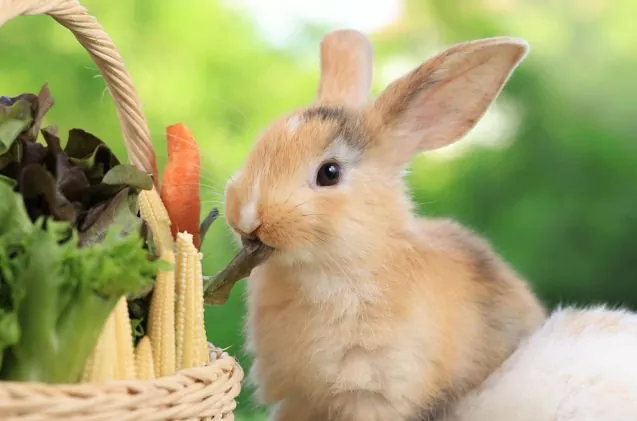
Feeding your rabbit the right fresh foods rabbits can and cannot eat impacts their overall health. Proper nutrition affects dental health, weight, and digestion.
Dental Health
Rabbits’ teeth grow constantly. A diet rich in fibrous foods helps wear them down naturally. Hay should make up 80-90% of your rabbit’s diet, with fresh veggies as supplements. Offer leafy greens like kale, spinach, and romaine lettuce. These foods require lots of chewing, which keeps teeth trimming.
Avoid soft or sugary fruits. They don’t provide enough abrasion and can lead to tooth overgrowth. Regular dental check-ups are vital. Watch for signs of dental issues like drooling or decreased appetite.
Weight Management
Controlling your rabbit’s weight is key to their health. Overweight rabbits face many health risks. Stick to a balanced diet. Limit treats and high-calorie foods. Fresh veggies are low in calories but high in nutrients. Good choices include:
- Carrot tops
- Bell peppers
- Cucumber
Fruits should only make up about 10% of your rabbit’s fresh food intake. They’re high in sugar and can lead to weight gain. Regular exercise is important, too. Provide space for your rabbit to hop and play.
Digestive Health
Rabbits have sensitive digestive systems. The right diet keeps their gut healthy. Fiber is crucial. It aids digestion and prevents issues like GI stasis. Offer a variety of high-fiber veggies such as:
- Celery
- Broccoli leaves
- Bok choy
Introduce new foods slowly. Sudden changes can upset your rabbit’s stomach. Avoid foods that can cause gas or bloating. These include:
- Cabbage
- Cauliflower
- Beans
Ensure your rabbit always has fresh water. It helps move food through their system. Watch for signs of digestive issues like small or misshapen droppings. Contact your vet if you notice any changes.
Understanding Herbivores
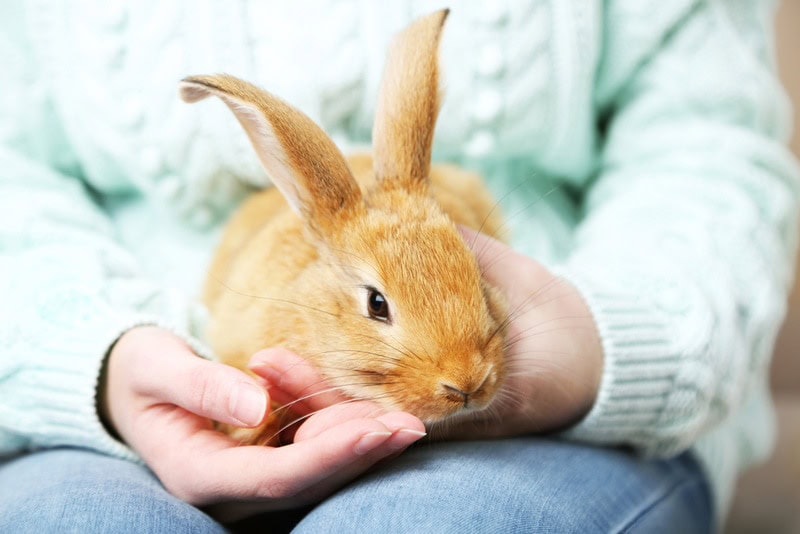
Rabbits are herbivores, which means they eat only plants. Their digestive system is specially designed to break down plant material. Herbivores like rabbits have long intestines that help them get nutrients from tough plant fibers.
They also have special teeth for grinding plants, making it crucial to understand which fresh foods rabbits can and cannot eat to keep their digestive system functioning properly.
You might notice your rabbit’s teeth never stop growing. This is because they need to constantly chew on tough plants. Rabbits have a unique way of eating. They eat their food twice! This is called coprophagy. It helps them get more nutrients from their plant-based diet.
A rabbit’s diet should be mostly hay. It keeps their teeth healthy and their digestion working well. Hay provides fiber that is good for rabbits. You can give your rabbit some vegetables as treats. Good choices include celery, carrots, and leafy greens. But be careful – not all plants are safe for rabbits.
Some plants can make rabbits sick. Avocado is toxic to rabbits and should never be given to them. Chocolate is also dangerous for rabbits. Remember, a happy herbivore is a healthy herbivore. Give your rabbit plenty of hay, some veggies, and fresh water. This will keep them healthy and content.
Take a look at this video on vegetables and fruits that could be harmful or even fatal to your rabbit.
By: Jaw-Dropping Facts
Safe and Unsafe Fresh Foods for Rabbits: What to Know
Understanding the fresh foods rabbits can and cannot eat is crucial for their overall well-being. Providing a balanced diet of primarily hay, supplemented with safe vegetables and occasional fruits, ensures that your rabbit receives the necessary nutrients without risking their health. Knowing which foods to avoid, such as avocados, chocolate, and certain plants, can prevent potential digestive issues or even life-threatening conditions. By carefully selecting the right fresh foods, you can keep your rabbit healthy, happy, and thriving.
As a pet owner, the responsibility of maintaining your rabbit’s diet can seem overwhelming at times, but this guide offers a solid foundation to make informed decisions. Always introduce new foods slowly, monitor your rabbit for any adverse reactions, and consult with a vet when needed. With the right care and attention, your rabbit will enjoy a varied, nutritious diet that supports their longevity and enhances their quality of life. By following these guidelines, you’ll create a diet plan that keeps your rabbit’s health in top shape for years to come.
Frequently Asked Questions
What Are the Daily Dietary Needs of a Rabbit?
Rabbits need a diet rich in fiber. Fresh foods should make up about 10% of their diet. The rest should consist of hay and a small amount of pellets. Give your rabbit unlimited hay and about 1/4 cup of pellets per 5 pounds of body weight daily. Offer 2 cups of fresh vegetables per 6 pounds of body weight.
Which Vegetables Are Safe for Rabbit Consumption?
Many leafy greens are great for rabbits. These include romaine lettuce, kale, and Swiss chard. You can also feed your rabbit non-leafy veggies like bell peppers and carrots. Herbs like basil are safe too.
Can Rabbits Safely Consume Cucumbers and Tomatoes?
Cucumbers are safe for rabbits in small amounts. They’re mostly water and don’t offer much nutritional value. Tomatoes can be given as an occasional treat. Remove the stems and leaves, as these parts are toxic to rabbits.
What Types of Fruits Can Rabbits Eat, Including Concerns With Skins and Peels?
Rabbits can eat many fruits in moderation. Good choices include apples, strawberries, and blueberries. Always remove seeds and pits from fruits. Wash the fruit thoroughly. Some peels are safe, but others may be hard to digest.
How Can You Identify Foods That Are Toxic to Rabbits?
Research before feeding new foods to your rabbit. Consult a vet or reliable online resources.
Connect with Us on Social Media and Spread the Bunny Joy!
Are you passionate about bunnies? We are, too, at The Rabbit Hop! Become part of our online community and enjoy:
Bunny Fun: Enjoy charming videos, discover interesting facts, and get tips for keeping your bunny happy!
Product Recommendations: Find the highest-rated items ideal for your furry friend.
Bunny Network: Engage with fellow bunny lovers who share your enthusiasm.
Follow us on:



